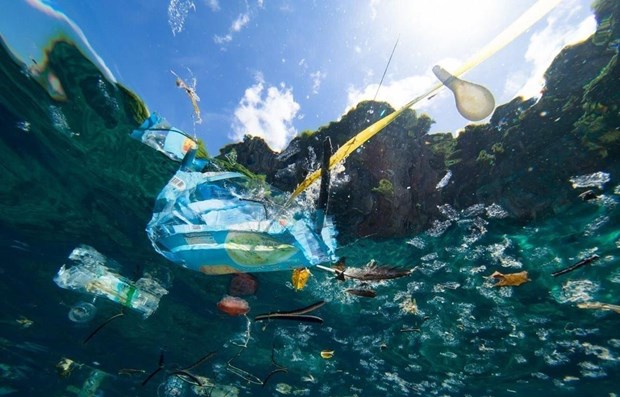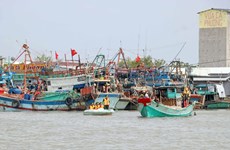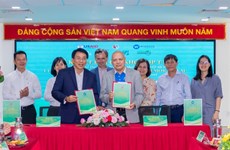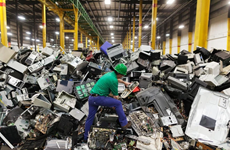Changing consumption habits around plastics to protect the sea
 Illustration. (Source: AFP)
Illustration. (Source: AFP)Hanoi (VNA)- In order to protect the marine environment and prevent "white pollution" in the oceans, the World Wide Fund for Nature in Vietnam (WWF-Vietnam) has called on the business community and consumers to limit business and use of plastic products, especially at the end of the year.
Vietnam discharges about 182,000 tons of plastic waste into the ocean every year
According to Mr. Nguyen Trung Thang, Deputy Director of the Institute of Strategy and Policy on Natural Resources and Environment at the Ministry of Natural Resources and Environment, it is estimated that every year, about 4.8 to 12.7 million tons of plastic are discharged into the oceans in the world. This figure of Vietnam is about 182,000 tons.
Particularly, two big cities, Hanoi and Ho Chi Minh City, release about 80 tons of plastic and non-biodegradable plastic bags every day.
To prevent plastics from reaching the environment, the Government has made fundamental changes to policies and laws on environmental protection and practical actions.
The Law on Environmental Protection 2020 has devoted one article (article 73) stipulating that, organizations and individuals are responsible for limiting the use, reduction, classification and disposal of single-use plastic products and non-biodegradable packaging or plastic packaging according to regulations. The law makes it illegal to dispose plastic waste directly into rivers and oceans.
Decree No. 08/2022/ND-CP also stipulates a roadmap to restrict the production and import of single-use plastic products, non-biodegradable plastic packaging and products and goods containing micro-plastics.
Accordingly, from 2026, single-use plastic products such as nylon bags and non-biodegradable plastic packaging will not be circulated and used in commercial centers, supermarkets, hotels, resorts, and tourist areas. After December 31, 2030, Vietnam will stop production and import of single-use plastic products, and non-biodegradable plastic packaging.
“However, not everyone has a complete understanding of plastic pollution. Throug our communication program with the content of recreating the behaviors of consuming single-use plastic products, which are so harmful to the environment and people, we hope customers will use plastics wisely, limiting plastic bags and plastic waste to protect our health and the environment," Thang said.
Accompanying the joint efforts of the Government, the Institute of Strategy and Policy on Natural Resources and Environment in collaboration with the World Wide Fund for Nature has organized many activities to raise awareness on reducing the use of disposable plastic bags and the generation of plastic waste.
One of the activities is the communication program "Thousand years of plastic waste" held at Big C Thang Long Trade Center in Hanoi capital. This program clarifies the harmful consequences of using plastic products.
Ms. Nguyen Thi Dieu Thuy, Director of WWF-Vietnam's Plastic Waste Reduction Program, said through the program, organizers hope businesses and consumers will be more responsible when using plastic products.
Through the program, each customer will understand more about the current "white pollution", the problem is caused by their use of plastics. From there, each person will gradually change their behavior, towards more sustainable consumption.
Mr. Nguyen Viet Dung, Director of Big C Thang Long Trade Center, said this is a very practical activity. Enterprises will accompany the State management agencies, actively advocate against the use of single-use plastic bags, and encourage customers to use more environmentally friendly cloth bags.
“We are gradually replacing single-use non-biodegradable plastic bags with eco-friendly bags, such as bags or banana leaves, to serve our customers. We believe that, with the support of customers, the sustainable 'green' consumption trend will be successful,” Mr. Dung shared./.














